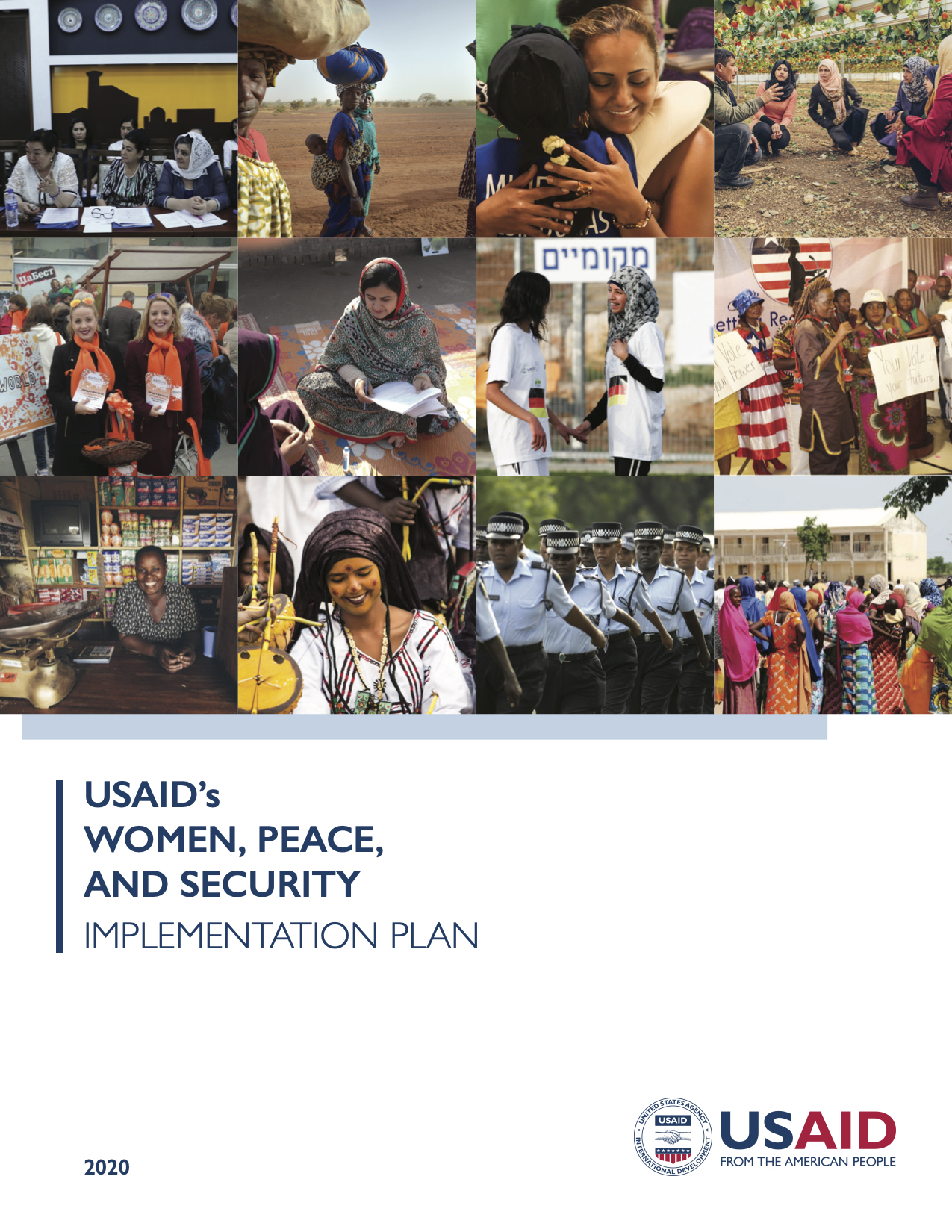- What We Do
- Agriculture and Food Security
- Democracy, Human Rights and Governance
- Economic Growth and Trade
- Education
- Environment and Global Climate Change
- Gender Equality and Women's Empowerment
- Global Health
- Humanitarian Assistance
- Transformation at USAID
- Water and Sanitation
- Working in Crises and Conflict
- U.S. Global Development Lab
Speeches Shim
USAID APPROACH
On June 11, 2019, President Trump signed the first-ever United States Strategy on Women, Peace, and Security (WPS Strategy). The U.S. Government (USG) developed the WPS Strategy to advance women’s meaningful participation in preventing and resolving conflict, countering violent extremism (CVE) and terrorism, and building post-conflict peace and stability.
The WPS Strategy establishes a clear roadmap to support women’s participation and leadership in preventing conflict and promoting stable, lasting peace around the world, including commitments to address the distinct challenges women and girls face in conflict- and disaster-affected areas. Under the WPS Strategy, the United States is working to advance three, mutually reinforcing objectives by 2023:
- Women are more prepared and increasingly able to participate in efforts that promote stable and lasting peace;
- Women and girls are safer, better protected, and have equal access to government and private-assistance programs, including from the United States, international partners, and host nations; and
- The United States and partner governments have improved institutionalization and capacity to ensure WPS efforts are sustainable and long-lasting.
USAID recognizes that investing in women’s leadership and empowerment is critical to break cycles of conflict and instability that threaten global security and support governments, civil society, and the private sector in partner countries on their own Journeys to Self-Reliance. As required by the WPS Strategy, the Agency has developed an Implementation Plan to support progress through concrete, effective, and coordinated action across our development and humanitarian-assistance efforts.
NATIONAL LINES OF EFFORT AND AGENCY ACTIONS
USAID’s planned actions are organized around the four lines of effort in the WPS Strategy. The following highlights represent key commitments included in the Implementation Plan:
Line of Effort 1 (Participation): Seek and support the preparation and meaningful participation of women around the world in decision-making processes related to conflict and crises.
Planned Actions
- Encourage the Inclusion of Women in Peace and Political Processes and Decision-Making
- Support Capacity-Building and Technical Training that Encourages Women’s Participation
- Address Barriers that Prevent Women’s Participation in Peace and Political Processes
- Consult with Local Women Leaders, Civil Society, Faith-based Organizations, and Academia
- Integrate Women and Girls’ Perspectives into USAID Countering Violent Extremism Policies and Programs
Line of Effort 2 (Rights, Access, and Protection): Promote the protection of women and girls’ human rights; access to humanitarian assistance; and safety from violence, abuse, and exploitation around the world.
Planned Actions
- Prevent Sexual Exploitation and Abuse
- Address Gender-Based Violence (GBV) in Humanitarian Emergencies
- Reduce the Harmful Effects of GBV and Increase Support for Survivors Affected by Crisis and Conflict
- Combat Violence against Women in Politics
Line of Effort 3 (Internal U.S. Capabilities): Adjust U.S. international programs to improve outcomes in equality for, and the empowerment of, women.
Planned Actions
- Designate Senior Leadership to Coordinate Implementation of the WPS Strategy and Support High-Level USAID Engagement on WPS-Related Issues
- Maintain Mechanisms for Agency-wide Coordination, Technical Assistance, Training, Learning, and Collaboration on WPS
- Enhance Staff and Mission Capacity to Integrate WPS Objectives in USAID’s Conflict Prevention and Stabilization, Humanitarian Assistance, and Resilience Efforts
- Review and Strengthen the Focus on WPS in USAID’s Centrally-Managed Funding Streams for Conflict Prevention and Stabilization
Line of Effort 4 (Partner Capacity and Commitment): Encourage partner governments to adopt policies, plans, and capacity to improve the meaningful participation of women in processes connected to peace and security and decision-making institutions.
Planned Actions:
- Engage Diverse Stakeholders, including Host Governments, International and Faith-Based Organizations, and Non-Governmental Actors to Mobilize Political Will, Action on WPS
- Support Partner Nations’ Legal and Policy Frameworks on WPS, including the Development and Implementation of National Action Plans on WPS
- Strengthen or Develop Partner Nations’ Transitional Justice and Accountability Mechanisms to Support Women and Girls
- Build Effective Multilateral and Bilateral Partnerships on WPS
ACCOUNTABILITY FOR RESULTS
For the first time, the U.S. Government will use a set of integrated WPS metrics developed by the U.S. Government interagency to measure progress on achieving the WPS Strategy’s ambitious goals by 2023. USAID is committed to robust efforts in Monitoring, Evaluation, and Learning (MEL) to support the full implementation of the WPS Strategy and the effective stewardship of taxpayer resources. Demonstrating measurable results, reassessing, and adjusting underperforming programming, and harnessing learning to inform future planning are integral to USAID’s approach to development and humanitarian assistance.
USAID is committed to the work ahead and to continued collaboration with our counterparts in other U.S. Government Departments and Agencies, host governments, civil-society, faith-based organizations, the private sector, and other partners—especially women and girls in countries affected by crisis and conflict—to make progress on this important agenda.
LEARN MORE
USAID Women, Peace, and Security: The United States Strategy on Women, Peace, and Security (WPS Strategy) responds to the Women, Peace, and Security Act of 2017, which established the United States as the first country in the world with a comprehensive law on WPS. USAID is supporting global programming designed to empower and protect women and girls in countries affected by crisis, conflict, violent extremism, and natural disaster. For more information on the plan, visit the Women, Peace and Security page.


Comment
Make a general inquiry or suggest an improvement.